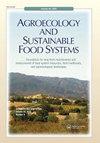在研究和支持农业生态转型方面处理生态化愿景的多样性
IF 2.6
3区 农林科学
Q1 AGRICULTURE, MULTIDISCIPLINARY
引用次数: 0
摘要
农业生态学越来越被认为是设想农业和粮食系统转型的相关框架,但通常以二元观点来解决,反对农业生态学的强烈或激进愿景,而不是弱的或渐进的愿景。本文基于对八个研究项目的集体、反思和比较分析,这些研究项目涉及农业系统和农业粮食系统规模的农业生态转型。每个项目都汇集了不同的参与者,他们对生态有着不同的看法。本文的目的是描述在项目中如何处理这种远景的多样性,以及有什么好处。我们表明,考虑到愿景的多样性对于理解农业生态转型是必要的,除此之外,在相关行动者之间分享这种多样性对于以包容的方式伴随他们,并在某些条件下丰富转型途径是必要的。我们还展示了采用分析方法来描述愿景的必要性,以及允许分享愿景和支持转型的参与性行动研究方法。最后,我们为本文进行的集体和反思过程也使研究人员能够根据他们在农业生态转型中的作用来定位他们的项目和他们自己。本文章由计算机程序翻译,如有差异,请以英文原文为准。
Addressing the diversity of visions of ecologization in research and in support to agroecological transitions
ABSTRACT Agroecology is increasingly recognized as a relevant framework for envisioning the transition of agriculture and food systems, but is often tackled in a dualistic perspective opposing strong or radical visions of agroecology to weak or incremental ones. This article is based on a collective, reflexive and comparative analysis of eight research projects dealing with agroecological transitions at the scale of farming systems and agrifood systems. Each project brought together a diversity of actors having different visions of ecologization. The aim of this article is to describe how and with what benefits this diversity of visions was addressed in the projects. We show that taking into account the diversity of visions is necessary for understanding agroecological transitions, and that beyond this, sharing this diversity among the concerned actors is necessary for accompanying them in an inclusive way and, under certain conditions, enrich transition pathways. We also show the need to adopt analytical approaches to characterize the visions along with participatory action-research approaches allowing to share them and support transitions. Finally, the collective and reflexive process we carried out for this article also enabled the researchers to situate their projects and themselves with regard to their role in the agro-ecological transitions.
求助全文
通过发布文献求助,成功后即可免费获取论文全文。
去求助
来源期刊

Agroecology and Sustainable Food Systems
AGRICULTURE, MULTIDISCIPLINARY-GREEN & SUSTAINABLE SCIENCE & TECHNOLOGY
CiteScore
4.80
自引率
7.70%
发文量
73
期刊介绍:
Agroecology and Sustainable Food Systems is devoted to the rapidly emerging fields of agroecology and food system sustainability. By linking scientific inquiry and productive practice with transformative social action, agroecology provides a foundation for developing the alternative food systems of the future. The journal focuses on the changes that need to occur in the design and management of our food systems in order to balance natural resource use and environmental protection with the needs of production, economic viability, food security, and the social well-being of all people.
Agroecology and Sustainable Food Systems examines our current food systems from production to consumption, and the urgent need to transition to long-term sustainability. The journal promotes the study and application of agroecology for developing alternatives to the complex problems of resource depletion, environmental degradation, a narrowing of agrobiodiversity, continued world hunger, consolidation and industrialization of the food system, climate change, and the loss of farm land. The journal uses a food systems approach, and seeks experiences in agroecology that are on-farm, participatory, change-oriented, and backed by broad-based methodologies of sustainability analysis and evaluation.
 求助内容:
求助内容: 应助结果提醒方式:
应助结果提醒方式:


